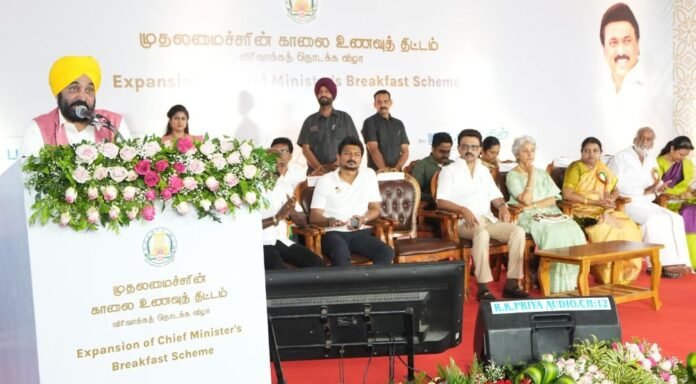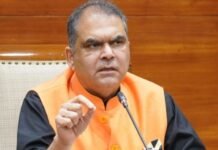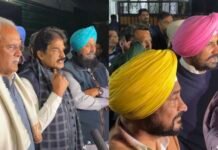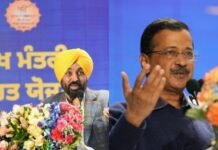Mann Attends Launch of Scheme Expansion in Chennai
Punjab Chief Minister Bhagwant Singh Mann on Tuesday announced that his government would study the feasibility of implementing Tamil Nadu’s Chief Minister’s Breakfast Scheme in Punjab, a program hailed for improving student nutrition and educational outcomes. Speaking in Chennai at the launch of the scheme’s expansion into urban areas, Mann emphasized that such welfare models are vital for inclusive development and could serve as a roadmap for Punjab’s education reforms.
Tribute to Karunanidhi, Praise for Stalin
At the event, Mann paid tribute to the late Tamil Nadu leader M. Karunanidhi, describing him as a towering figure who consistently defended federal principles and state rights. He praised Chief Minister M.K. Stalin for carrying forward his father’s legacy with equal commitment, calling him a “true mass leader” dedicated to people’s welfare.
Why the Scheme Matters
Tamil Nadu’s breakfast program began in September 2022 across rural primary schools, benefiting over 1.75 million students in nearly 35,000 schools. With its extension to urban government-aided schools, the initiative has demonstrated higher student attendance, better learning outcomes, reduced malnutrition, and lower disease rates among primary school children. Inspired by these results, Mann said the Punjab Cabinet would soon examine options for replicating the scheme to address similar challenges faced by schoolchildren in his state.
Punjab’s Education Push
Highlighting his government’s reforms, Mann said Punjab has emerged as a frontrunner in education, topping the Government of India’s National Achievement Survey, even surpassing Kerala. He shared success stories where 848 government school students cleared NEET, 265 qualified JEE Mains, and 45 entered JEE Advanced, underlining the improving standards of public education in Punjab. Mann also noted the Schools of Eminence project, international training programs for teachers in Singapore, Finland, and Ahmedabad, and special transport facilities for girl students to promote equal access to education.
Healthcare Reforms in Punjab
Linking education with healthcare, Mann highlighted the upcoming Mukh Mantri Sehat Yojna, under which every family in Punjab will be entitled to free medical treatment worth ₹10 lakh annually, regardless of income. He said the scheme will benefit over 30 million residents. Punjab currently operates 881 Aam Aadmi Clinics, serving 70,000 patients daily, with plans to add 200 new clinics. To improve communication, a WhatsApp chatbot has been launched for easier access to health services.
Mann’s Call for Social Welfare Governance
The Punjab CM stressed that welfare schemes addressing nutrition, education, and healthcare are crucial for strengthening democracy and empowering underprivileged communities. “Just like Tamil Nadu, Punjab too is working with missionary zeal to uplift its people and build a Rangla Punjab,” he said, adding that social reforms must become central to governance.
Invitation to MK Stalin
Mann extended a warm invitation to Stalin to visit Punjab, describing it as the “sacred land of saints, gurus, prophets, and martyrs.” He commended Stalin’s leadership, stating that committed, people-centric leaders are rare in today’s political landscape and that his model deserves national recognition.
Political Undertone: Criticism of National Leadership
In a pointed attack on the Union government, Mann criticized what he called the “master of phraseology” leading the country, accusing national leadership of betraying citizens with empty promises such as “acche din” and the unfulfilled assurance of ₹15 lakh in every bank account. He warned that public disillusionment with politics could undermine democracy itself, urging leaders to prioritize real reforms over rhetoric.
Broader Implications
Mann’s announcement reflects a growing trend where Indian states are learning from each other’s welfare models. Just as Tamil Nadu has pioneered school meal programs, Delhi’s AAP government influenced free healthcare clinics later adopted in Punjab. This cross-pollination of policies highlights a federal ecosystem where welfare-driven governance is increasingly shaping political narratives. Internationally, such schemes resonate with UN Sustainable Development Goals (SDGs) on quality education, good health, and reduced inequality—making Punjab’s potential replication of Tamil Nadu’s initiative globally significant.




